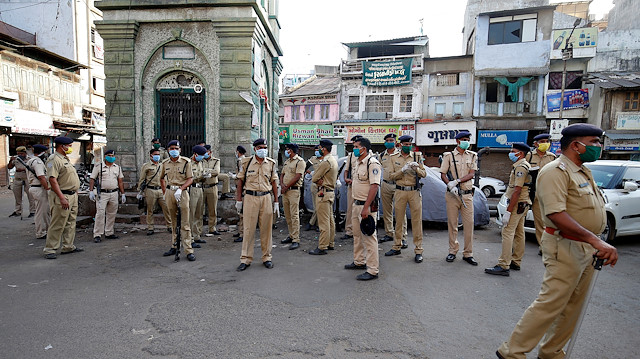
Death toll from coronavirus reaches 136 as number of cases crosses 4,780
With the number of novel coronavirus cases in India continuing to rise and the death toll climbing to 136 on Tuesday, health experts have called for more testing in the country.
According to the Indian Council of Medical Research (ICMR), as of Monday afternoon, they had tested 101,068 samples -- a very minimal number in a country of 1.3 billion people -- as the first coronavirus case in the country was reported on Jan. 30.
The council also said 136 government laboratories and 56 private laboratories have been made functional and these laboratories have a capacity of 18,000 tests per day.
“India’s [coronavirus] strategy was conservative and limited to only those persons with a travel history or connected to such individuals. We have gone up from 5 per million one month back to about 30 now, said K Sujatha Rao, a former health secretary.
"Unless we test much more, we will never know the actual extent of the problem and understand whether our interventions are adequate or falling short,” said Rao, who is the author of But Do We Care: India's Health System.
“I hope that the lockdown and expanded testing and treatment will help contain and mitigate the epidemic. Since more cases are coming up, it is imperative to scale up testing to understand the actual spread of this infection,” he told Anadolu Agency.
India has reported a total of 136 deaths of coronavirus, with around 4,780 confirmed COVID-19 cases across the country as of Tuesday morning.
Gagandeep Kang, a clinical scientist who heads the Translational Health Science and Technology Institute in India, said “not enough tests are happening.”
“We need to expand PCR [polymerase chain reaction] testing as much as possible and also develop a rapid antigen test,” she told Anadolu Agency.
PCR tests are used to directly detect the presence of an antigen, rather than the presence of the body's immune response, or antibodies.
“We will see a synchronous development of localized outbreaks in different regions with size depending on how effective the lockdown was in that area. We are too big a country with too many people for uniform spread through our population. Preparedness depends on the scale of what happens where.”
The ICMR last week also issued an advisory to start rapid antibody-based blood tests for COVID-19 “in areas reporting clusters and in large migration gatherings or evacuee centers.”
ICMR Director-General Balram Bhargava wrote to India’s Health Secretary Preeti Sudan asking her to disseminate an advisory in states and union territories to start rapid antibody- based blood tests for COVID-19.
"Overall testing for COVID-19 using real time RT-PCR is increasing, and we will be approaching full capacity in the near future. At the same time, we are expecting delivery of rapid (blood-based) test kits for use in response to the COVID-19 situation," Bhargava said in his letter.
Ramanan Laxminarayan, director of the Washington-based Center for Disease Dynamics, Economics and Policy and a lecturer at Princeton University, told Anadolu Agency that while “India has been proactive in tackling the epidemic both by sealing borders and locking down the country, the biggest such exercise in the world,” testing has been slow.
“India has among the lowest rates of testing in the world but is picking up speed. Rapid antibody-based tests are now being introduced. There is still a long way to go and there is simply no way for any country to win against COVID-19 without extensive testing,” he said.
But will more testing help?
“Increasing testing will show how the epidemic is progressing. As with most countries, India is probably undercounting cases. But the health system is likely to be tested and everyone is hoping that it will perform adequately and that the world will be able to defeat this disease,” said Laxminarayan.
On Monday, the ICMR said with “a view to preparing for the worst-case scenario,” they are considering “scaling up testing capacity to 1 lakh tests/day in upcoming months,” he said, or 100,000 tests per day.
Doctors in India say the next two weeks will reveal a national trend of COVID-19 in India.
“We have to wait for two weeks to see the national trend. Thankfully, going by the numbers in India now, cases are not rising like we have seen exponentially in other countries,” said Dr. D. Bahera, a north India-based pulmonologist.
Hello, the comments you share on our site are a valuable resource for other users. Please respect other users and different opinions. Do not use rude, offensive, derogatory, or discriminatory language.
The floor is all yours.








